What makes a Long-lasting Company?
1. Actual conditions of long-lasting companies
Do you know how many long-lasting companies there are, the industries they are in, as well as their scale and such?
According to a 2014 Japanese survey by Teikoku Databanks, there are a total of 27,335 long-lasting companies (those founded over 100 years ago) in Japan.
If we break the figure down by industry, there are 7,367 retailers—alcoholic drinks, textiles and fabrics, women’s and children’s clothing, etc. (27.0% of total), 6,594 manufacturers (24.1%), 6,248 wholesalers (22.9%) and 2,720 construction companies (10%). Categorized by annual sales, there are 11,361 companies (41.6%) which earn less than 100 million yen annually, and 10,940 companies (40.0%) earn from 100 million to less than 1 billion yen a year.
As we can see, small to medium-sized enterprises with annual sales of less than 1 billion yen make up approximately 80% of Japan’s long-lasting companies (from here on referred to as LLCs).
The phenomenon is further underlined when countries are compared. In The Rule to Getting Pass the Three-Generations-and-100-Year-Mark (President Inc., 2009), Toshio Gotou published results of a survey which looked at companies established over 200 years ago worldwide. The survey found that 43% of the companies are Japanese, 22% are German, and 5% are French. As such, it can be said that Japan is a global superpower when it comes to LLCs.
The American business philosophy, however, holds that “A company is a tool with which investors gain profit. Should a company lose its value, it is better to retire it from the market.
Allowing a company on the brink of losing its meaning of existence to continue is a waste of effort which could otherwise be used to build up a new enterprise from scratch, or devoted to a good enterprise”. By these standards, our unconscious belief that LLC equals wonderful may be deemed nonsensical right off the bat.
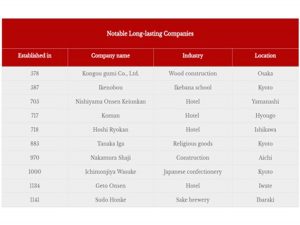
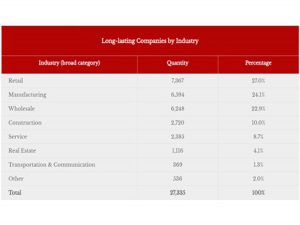
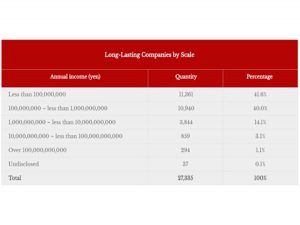
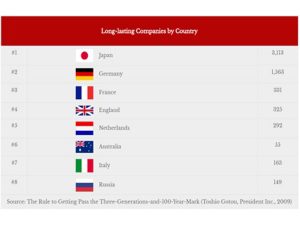
2. Characteristics of a Long-Lasting Company
In The Living Company (Nikkei BP Inc., 1997), Arie De Gues observed how companies with history dating back over one hundred years worldwide manage their businesses, and conclude that they all possess four common characteristics:
3. Adaptability to the External Environment
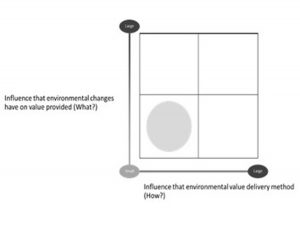
n this section, let’s take a look at 1) Sensitive to changes in the environment, namely, adaptability to the external environment. This can, perhaps, be best expressed by a famous quote of Charles Darwin: It is not the strongest that survives, nor the most intelligent that survives. It is the one that is most adaptable to change.
From this point on, we will define sensitive to changes in the environment as adaptability to change, and consider the subject along two axes: the necessity of changing value to deal with changes in environment and the necessity of changing the method to realize and provide value to deal with changes in environment.
If we look at the retailers ranked among the oldest companies in the earlier table, for example, alcohol breweries, and think along these two axes, it will become clear that though times change, due to the value that the business provided, as well as its method of providing and realizing said value, being the basic one of simply brewing sake and selling it, it can be said that the necessity for change is low compared to other industries. Same goes for old ryokans, Japanese confectionery and textile businesses as well.
Adaptability to change would demand that if a company operates in an environment where change is swift, the company must also deal with those environmental changes with speed as well. However, in this sense, it would also mean that if changes are slow, your company “can deal with it slowly, or even leave things the way it is”.
One feature of LLCs is that, be it the value, or the method of providing it, the influence of environmental changes on existing businesses is little; a large-scale overhaul of conventional value or value providing and realization methods is not necessary, and those have been passed on unchanged. It can be said that, as a result, these companies have an inherent adaptability to change and can be categorized as long-lasting companies.
4. Conclusion
We have confirmed that there are a large number of long-lasting companies in Japan.
When we consider adaptability to the external environment, one common characteristic of LLCs emerges: even as the environment changes, the influence on value and the method of realizing and providing value is small, and they are passed on the way they are.
To quote Competitive Strategies: A story (Ken Kusunoki, Touyou Keizai Inc., 2010), it can probably be said that these companies have been practicing the strategy that picks the sweet business domain for more than 100 years.
Thank you for your interest.
Please fill in some important information and we will be in touch.